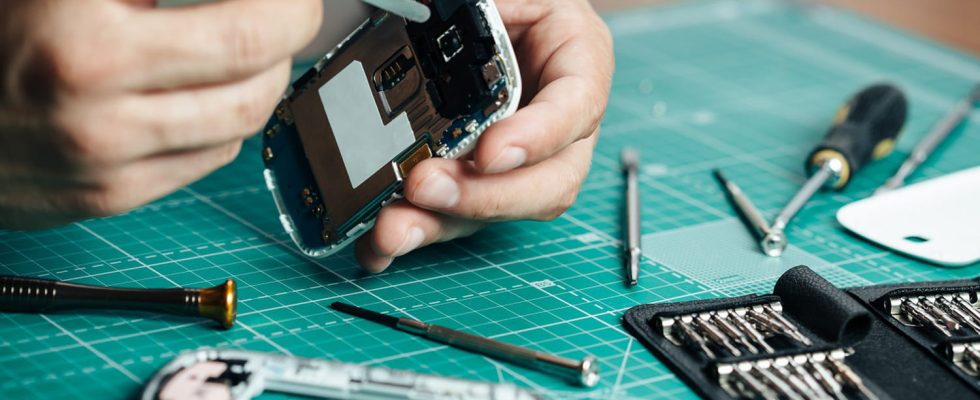The European Union extends the right to repair by imposing a one-year warranty for products repaired by professionals. An excellent idea that will better combat the obsolescence of electronic devices.
One of the causes that encourages you to buy a new electrical or electronic device is a breakdown: either it is irreparable, or the cost of the part to change is exorbitant – so you might as well buy a new one. This suits some manufacturers, who go so far as to voluntarily limit the lifespan of a device so that the consumer is forced to buy a new one fairly quickly – this is what we call planned obsolescence. To limit this phenomenon, the Government had put in place the famous repairability index, which will evolve into a durability index (see our article), in order to indicate to consumers the least ecocidal devices.
Because perpetual renewal has a significant cost, both in terms of resources used and waste. The production of a device is the most polluting phase of its existence, due to the extraction of raw materials, which makes it responsible for part of the world’s greenhouse gas emissions. This is why equipment must be used for a long time so that its environmental impact is as low as possible. To combat this obsolescence, the French government intends to encourage consumers to repair their devices rather than immediately buying another one in the event of a breakdown via the anti-waste law for a circular economy (AGEC law). To go further, MEPs voted on Tuesday April 23 a new directive on the right to repair, which aims to reduce waste and encourage repair, making it more accessible and less expensive. European consumers will soon have the right to “a reinforced right to repair” for their washing machines, dishwashers, refrigeration appliances, vacuum cleaners, servers and data storage products, but also for their smartphones and tablets.
Strengthened right to repair: what is changing
This directive aims to significantly extend the warranty for an electronic object that has been repaired. It will therefore benefit from an additional legal guarantee of twelve months, for each repair the product will benefit from. To put it simply, if you buy a phone, you benefit from a legal guarantee which is generally two years in most European countries. If, during this period, you have your device repaired, the repairer will add twelve months of warranty. This means that the seller will have to repair or replace the product again if it fails during this period. Note that the directive specifies that EU member states will be able to extend this additional warranty period as they wish – there is therefore theoretically no longer a time limit on the warranty for a smartphone. In short, it’s a good way to encourage consumers to prioritize repair.
With the agreement, manufacturers will have to ensure that customers are clearly informed about how their device can be repaired. Repairs must be completed in a timely manner and at a price “reasonable”, if they are not free. Consumers should also have the option to borrow a device while theirs is being repaired or opt for a refurbished device. Finally, the voted text also applies when the malfunction appears during use of the device, such as a screen that cracks or breaks after a fall. Manufacturers will have to “make available, and at a reasonable price, the products necessary to [leur] repair”including “spare parts, replacement”. Note that second-hand or 3D-made spare parts are also authorized, which should help improve their availability on the market.
Right to repair: an extended warranty to facilitate the process
The agreement provides for prohibiting manufacturers from creating obstacles to repair, such as removing the warranty in the event of repair with a non-contractual part, setting up excessive fees to be able to access the tool which will permit repair, or the use of proprietary software or hardware that prevents independent repairers from repairing the Products. This measure directly targets Apple, which tends to add a serial number to the different parts of its devices, rendering some of their functions inoperative if you do not go through a reseller authorized by the brand or through the particularly complicated home repair system. (and not necessarily cheaper).
René Repasi, German MEP (S&D), explains during the press conference that“Apple will have to prove that it is absolutely necessary to maintain this barrier to protect its intellectual property, which should not be so simple, and what will certainly end up in court. These practices should be considered, in my opinion, as illegal.”.
Right to repair: informing European consumers
In its desire to inform consumers, the European Union will set up an online platform including national sections will be set up. It will help consumers easily find local repair shops, sellers of refurbished goods, buyers of defective items or crowdsourced repair initiatives, such as “repair cafes”.
Each Member State will have to implement at least one measure to promote repair, such as repair vouchers, courses to learn how to repair, funding, information campaigns or support for participatory repair spaces. In France, the Government already offers a repair bonus (see our article).
For René Repasi, thanks to this text of law, “it will be simpler and cheaper to opt for repair rather than buying new, more expensive products. Consumers’ right to repair of goods will now become a reality”. What to avoid “the 35 million tonnes of waste generated each year in the European Union” by “premature disposal of consumer goods”. The directive must now be approved by the Council. The various members of the European Union will then have to have it voted into their national law within twenty-four months after its publication in the Official Journal of the EU.
